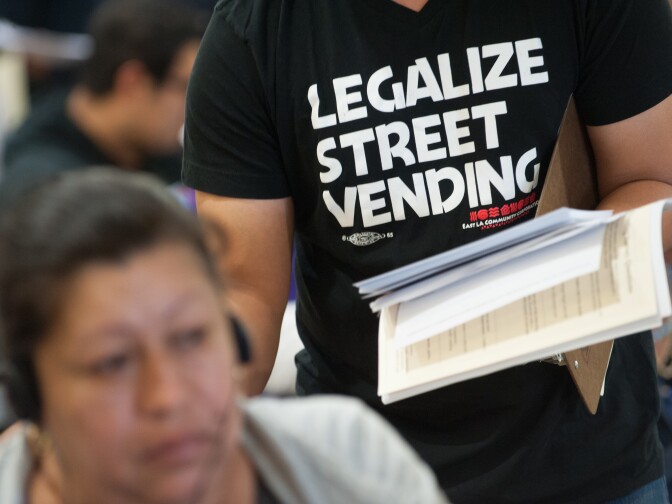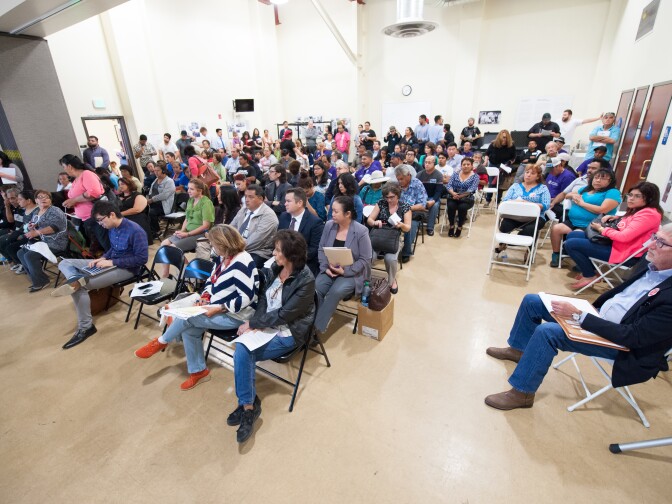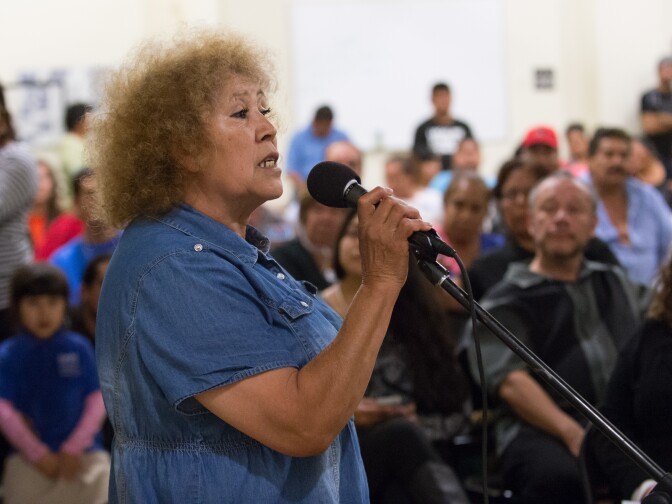This story is free to read because readers choose to support LAist. If you find value in independent local reporting, make a donation to power our newsroom today.
This archival content was originally written for and published on KPCC.org. Keep in mind that links and images may no longer work — and references may be outdated.
LA resumes its debate on street vending in a series of public hearings
The long-running debate over whether to legalize street vending in Los Angeles is back in full swing, and there's no easy resolution.
Street vendors, their supporters and opponents of legalized street vending packed a meeting room Thursday night at the Boyle Heights City Hall. Vendors testified as to how complicated it is to earn a living in what's technically an illegal occupation.
"I make $90 a day," Juan Mendoza, a clothing street vendor in MacArthur Park, told a small panel of city officials hearing comments. "But...our life is very different than yours. Our days start at 4 a.m. and we'll finish at around 9 p.m., just for a few dollars."
There are an estimated 50,000 vendors operating in the L.A. area, selling items ranging from food to clothing to electronic gadgets. But they're not allowed to operate legally on the sidewalk. Several attempts to let them apply for permits so they can sell their wares legally have fallen flat.
Since last year, council members Curren Price and Jose Huizar have pushed an ordinance that would legalize street vending citywide. In December, the city's Economic Development Committee sent proposed guidelines for the plan back to the Chief Legislative Analyst's office for retooling.
City officials sponsored the town hall in Boyle Heights. Felipe Chavez, a city legislative analyst, explained three alternatives that are being contemplated:
"Number one, which is to maintain the status quo, and possibly increase enforcement," Chavez said, "or to establish a citywide program...with certain regulations in place, and the third option is a community-driven option, where the community brings forward a proposal to the council, and the council determines as a whole whether that type of program would be appropriate for the community."
But there was little consensus among the people who spoke at the hearing. Opponents who showed up ranged from small brick-and-mortar business owners to Hollywood Boulevard merchants to a local property owner, who said she feared the gang members who extort money from street vendors.
"We had this problem back in 2000; what was happening is gang members were extorting them for areas," said Yolanda Gonzalez, who owns apartment property in Boyle Heights but lives on the Westside.
Gonzalez said police could not stop it: "They weren't able to do it in 2000 when they had more police officers, what do you think we are going to do now?"
Nicole Shahenian with the Hollywood Chamber of Commerce said she wasn't opposed to the idea of legalized street vending in general, just not on Hollywood Boulevard.
"There's already an overabundance of, not only sidewalk vendors, but street characters and CD vendors and tour bus operators out there soliciting," Shahenian said. "It has already created a huge public safety nightmare for the LAPD, and for our business improvement district patrols. If they expand it and legalize it with a one-size fits all policy, its really just going to exacerbate the problem."
Shahenian said she hoped business districts like the one in Hollywood could opt out if there is a citywide plan.
Chavez, the city analyst, said if there's a citywide policy, vendors could apply to work in specific areas - for example, in a park, or on a certain commercial corridor.
But vendor advocates said they're wary of too many restrictions on where vendors can operate.
The city's last major stab at legalizing street vending, in the 1990s, eventually led to a small vending district being created in MacArthur Park. It flopped - largely because, while vendors in the park had to pay fees and operate according to the rules set, vendors outside the park didn't.
"To expect that vendors will be boxed up in some vacant lot somewhere in South L.A, and that people are magically going to go there and do their commerce, is not realistic," said Mike Dennis with the East Los Angeles Community Corporation, which supports a citywide plan without zone restrictions. "Vendors vend where there's a market for it. People buy street food, and people buy wares on the street."
The Boyle Heights meeting was the first in a series of vendor legalization talks planned throughout the city. Another is set for June 11 in Van Nuys.















